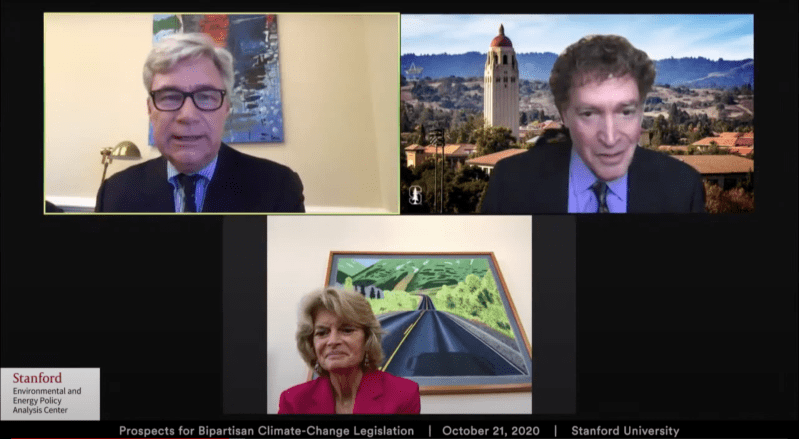Sens. Lisa Murkowski (R-Alaska) and Sheldon Whitehouse (D-R.I.), two leading U.S. environmental policy decision-makers, discussed how to proceed with climate action and the potential dynamics of the next Congress at an event on Wednesday. The senators clashed over whether a second term for President Donald Trump would help or hinder the climate but agreed that climate action is necessary.
Murkowski and Whitehouse have previously worked on legislation together and both participate in environmental committees in the Senate. Murkowski is chair of the Senate Energy and Natural Resources Committee, charged with comprehensively studying energy and resource development. Whitehouse is a member of the Senate Environment and Public Works Committee, where he exercises legislative jurisdiction over infrastructure as it pertains to the exploitation of natural resources.
The discussion was moderated by economics professor and Stanford Environmental and Energy Policy Center Director Lawrence Goulder, and at its peak, over 500 viewers tuned in to watch the senators exchange ideas on clean energy, carbon capture technology and how the upcoming presidential election will impact which bills get passed.
Stanford Institute for Economic Policy Research Senior Fellow and economics professor Charles Kolstad opened the event by naming the objective of the conversation: “to find political solutions to climate change problems.”
He said the discussion was not a debate over the existence of climate change, but rather an exploration of what the political landscape will look like in the next U.S. Congress and how the upcoming election will affect how politicians assess solutions.
Murkowski, a proponent of fostering innovation and clean energy, said that if Trump wins a second term, Congress would still promote greater investment in clean energy technologies.
She cited an energy bill that she and Sen. Joe Manchin III (D-W.Va.) have been working to advance that supports “innovation in advanced geothermal research and development,” which has gained “strong bipartisan support.”
Whitehouse, an attorney who supports climate action, said that based on Trump’s past record, he doubted that a second term would help facilitate fighting climate change. He characterized Trump’s first term as “pretty terrible.”
“I think that the disrespect for science generally is augmented by a particular disrespect for climate science,” he said.
Notwithstanding that climate policy would be an “uphill push” under Trump, he said that there is “a lot of bipartisanship on this issue,” specifically emerging from Murkowski’s latest efforts on an energy bill and blue carbon bill.
Meanwhile, Democratic nominee and former U.S. Vice President Joe Biden is campaigning on a platform including a $2 trillion expenditure for climate action and plans to rejoin the Paris Agreement.
Whitehouse said that if Biden is elected, he anticipates that a climate bill could quickly pass Congress.
“I think we go very quickly to a climate bill and we probably use the budget reconciliation process to make sure that we have something that can pass,” Whitehouse said. “We walked away from this problem in the Obama administration. I don’t think we can do that again.”
Whitehouse also spoke to the specter of severe weather storms, permafrost changing water temperatures and trillion-dollar housing market crises on coasts with rising sea levels.
“The last decade we’ve had has come at a terrible price for our national credentials and reputation, and we’ve got to reboot ourselves and up to international leadership on this and get it done,” Whitehouse said.
Murkowski warned that if policies quickly passed under a Biden administration are not bipartisan, they will not endure.
When asked where “the sweet spot” is for bridging Republicans and Democrats, Murkowski acknowledged that immediately transitioning off fossil fuels is not “tenable.” She also recommended that the government look into hydropower and nuclear energy, along with natural gas, to reduce emission.
The two then moved to discuss a carbon pricing policy, a market-based strategy for lowering emissions. Whitehouse described carbon pricing as a solution, but Murkowski said that it makes Republicans “more than a little bit nervous.”
She said that market forces imposed by carbon pricing are predictable, contending that carbon pricing would increase costs. Alaska already has some of the highest energy costs in the country, according to Murkowski, and she said she will prioritize ensuring that the “energy-vulnerable are not hurt.”
“This is a very pragmatic discussion that we need to have,” Murkowski said. “Energy is good, emissions bad. How do we work to reduce our emissions in recognizing that we all want to have the benefits of good energy?”
Murkowski contextualized her point with an anecdote. Eight years ago, in Aniak, Alaska, she was approached by a woman carrying a baby. Living paycheck-to-paycheck, the woman described alternating spending her money to heat her home or to feed her baby.
Whitehouse said Murkowski’s point was “dead right”: “I’m on board with Chairman Murkowski,” he said, adding that the conversation around energy pricing should focus on doing it in such a way that “doesn’t further harm disenfranchised or make life difficult for people who already suffer those burdens.”
Contact Matthew Turk at mjturk ‘at’ stanford.edu.
